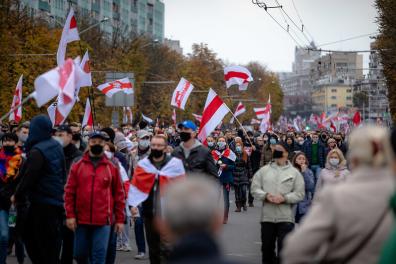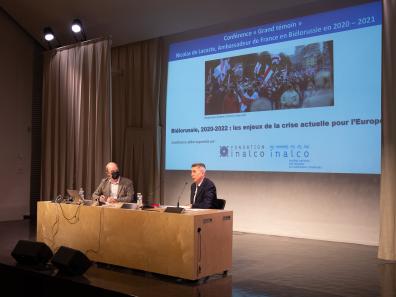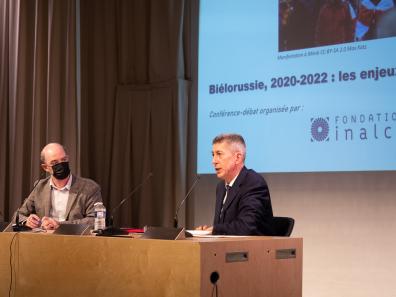Keynote speaker: Nicolas de Lacoste, French Ambassador to Belarus from 2020 to 2021

On August 9, 2020, Belarus descended into social and political instability following the rigged re-election of Alexander Lukashenko, already at the country's helm since 1994. France, along with a large number of European Union member states, did not recognize the election results, marking the end of trade between Belarus and Western countries. The Russian Federation affirmed its support for Lukashenko's authoritarian regime.
It was against this backdrop that Nicolas de Lacoste took up his post as French Ambassador to Belarus in 2020. He was stationed in Minsk for ten months, in a climate of tension, before being forced by the Belarusian government to leave the country on October 17, 2021. Minsk reproached him for refusing to hand over the originals of his credentials to the Belarusian president. The French diplomat is now a special envoy of the French government, a very rare status reserved for conflict zones, as Nicolas de Lacoste reminds us during his speech.
The domestic situation in Belarus
Belarus holds the sad European record for the number of political prisoners, which stands at nearly a thousand. Among them are political opponents, members of NGOs and also journalists, branded as extremists. This observation resonates very heavily within the walls of the Inalco auditorium, all the more so as among these detained men and women there are also many young people, Belarusian students or high school pupils, who have taken part in opposition demonstrations.
Nicolas de Lacoste reminds us, moreover, that the image projected behind him is punishable by imprisonment in Belarus and is considered "extremist material". Opposition to Lukashenko's authoritarian political regime brandishes at demonstrations the flag of the Belarusian People's Republic of 1918, which had been banned by the Soviets and by the current leader. The mere display of this flag therefore constitutes an act of uprising, heavily punished by the Belarusian authorities. All images of these movements have been banned, as if the protests had never taken place. In fact, for fear of reprisals, the Belarusians largely censored themselves.

The diplomat speaks of a "hemorrhage" with many Belarusians fleeing to border countries such as Poland, Lithuania, Latvia and Ukraine. This is also the case of the regime's main opponent, Svetlana Tikhanovskaya, who had to flee to Lithuania as she was prosecuted in her own country for "acts of terrorism", following her calls for demonstrations in the summer of 2020.
Geostrategic consequences
Tightening ties between Moscow and the Minsk regime
Despite tumultuous relations between the two leaders, the Russian Federation recognized Alexander Lukashenko as the leader of Belarus. Vladimir Putin has assured him of his support and is particularly favorable to the revision of the Belarusian constitution, which provides for a reinforcement of Lukashenko's powers. Not without a quid pro quo for Russia, as the constitutional revision also provides for the deletion of an article in the constitution which until now prohibited the Russians from positioning troops and nuclear weapons on Belarusian soil.
A lasting deterioration in relations between Belarus and the West
Minsk was for some decades a venue for international meetings, enabling the signing of important treaties such as the "Minsk Treaty" on December 8, 1991, ratifying the break-up of the Soviet Union, or the "Minsk Protocol" signed on September 5, 2014 putting an end to the war in Ukraine. All this came to an end on August 9, 2020, marking a clear split between Belarusian and Western relations, which are in the process of implementing economic sanctions that will gradually harden. These measures are designed to give pause to Lukashenko's entourage, whose support will cost his allies more and more as the economic situation in Belarus deteriorates. The examples of the various expulsions of Western diplomats, such as Nicolas de Lacoste, also illustrate this observation.
The installation of a focus of lasting instability on the borders of the European Union
Nicolas de Lacoste reminds the incident involving Ryanair flight 4978 from Greece to Lithuania, hijacked by a Belarusian military aircraft to force it to land in Minsk in May 2021, with the sole aim of arresting and imprisoning journalist and opposition activist Roman Protassevitch. The diplomat also recalls the "border crisis" and the dramatic situation of thousands of refugees from the Middle East, whose arrival has been skilfully orchestrated by the Belarusian regime, in order to destabilize and put pressure on Western powers. Every day, dozens of migrants attempt to cross the Polish border into the European Union.
The Installation of Military and Nuclear Bases in Belarus
OnFebruary 27 a constitutional referendum will be held providing for the deletion of Article 18 of the current constitution concerning the country's military and nuclear neutrality. Russia and Belarus will then set up a "common military doctrine " with the possible deployment of military bases and storage of nuclear weapons on Belarusian soil.

"Keep hope alive"
The former French ambassador to Belarus is nevertheless keen to convey a message of hope, and calls on Western countries to support the now structured and legitimate opposition, embodied by Svetlana Tikhanovskaya, but also by Belarusian civil society, which continues to fight at the risk of its freedoms. Nicolas de Lacoste highlights the rapid transformation of Belarusian society, which is educated, travels and opens up to the world, and aspires to a "normal life".
Inalco and its Fondation are mobilizing to ensure that the Belarusian political crisis is not forgotten. The Bielorussian language is one of the more than one hundred languages taught at Inalco.
Retrouvez l'intégralité de la conférence-débat Grand Témoin de la Fondation Inalco en replay
Edited by: Cécile Leblond / Inalco Foundation